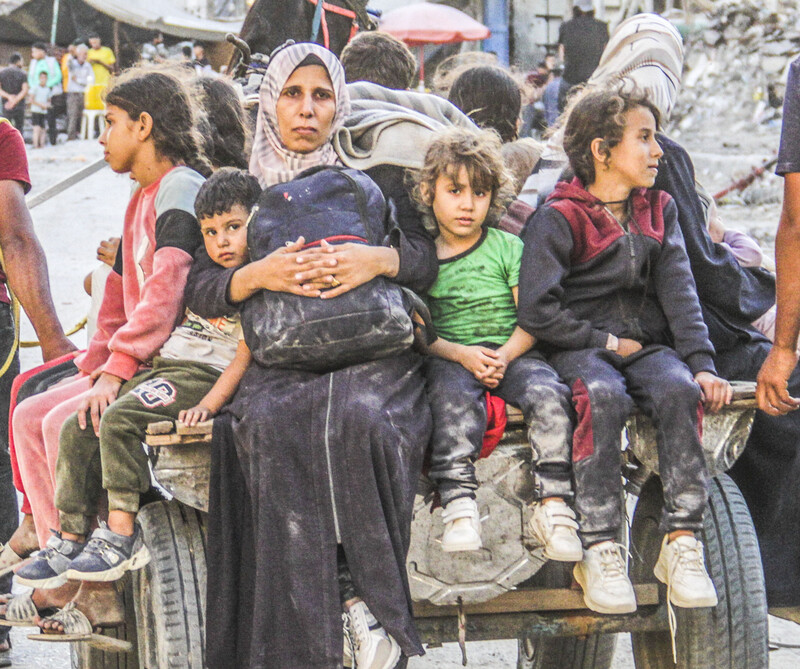The Electronic Intifada 24 November 2024

Palestinians continue to demonstrate resolute determination amidst the horror of a renewed Israeli invasion of Jabaliya.
Xinhua News AgencyWhen the Israeli army once again returned to commit atrocities in Gaza’s Jabaliya refugee camp, I was overwhelmed with anxiety. What do they want from this devastated place? This is now the third invasion – what more is there to destroy?
Why Jabaliya camp? Is it because of its dense population, its status as the largest refugee camp in size in the Gaza Strip or the poverty of its people? And which place will be targeted next?
I lived in Tal al-Zaatar, the “Hill of Thyme,” in Jabaliya camp for over 18 years. It’s a name that belies the reality of its suffering. It was my refuge during the war for more than a month.
To see my neighborhood wiped from existence weighs heavily on my heart. My people are being killed, tortured and displaced from their homes. The suffering is unbearable. I know this pain intimately; I am one of them – a descendant of refugees from 1948 – and losing a home for the second time has been my greatest nightmare.
I still struggle to understand the true intentions of the Israelis. What they are doing seems far removed from their stated objectives, hinting at such barely hidden motives as Jewish resettlement of Gaza and ethnic cleansing of the Palestinian population. This war has also been fueled by a vengeful madness Israel has invoked as justification since 7 October last year.
Over the past year, this mentality has become normalized, obscured by governments’ indifference, complicity and ineffective measures. Israel has transformed this madness into operational protocols, security measures and a framework of governance.
A cycle of aggression
On the morning of 6 October 2024, the Israeli army unexpectedly invaded Jabaliya, coinciding with the first anniversary of 7 October.
For residents already enduring a year of genocidal bombardment, this assault unleashed a new wave of destruction. Familiar tactics targeting hospitals and killing civilians in their homes highlighted the unwavering brutality.
Seven weeks into this ongoing invasion, the camp where I once lived has turned into a wasteland of bombed-out buildings and shattered lives. Entire neighborhoods lie in ruins, with families trapped beneath the debris.
Hospitals, already overwhelmed with casualties, have again become targets themselves. The Indonesian Hospital was hit by shelling. Kamal Adwan hospital, once vital for Jabaliya, is now running under extremely difficult conditions after again being invaded by the Israeli army, which also forced the civil defense team to leave Jabaliya camp. The future for doctors and patients remains unknown. This week, the hospital was bombed by the Israeli military.
Communication lines have been severed throughout Jabaliya, isolating families who can no longer call for help. Without internet or phone access, the people of Jabaliya face their fate in silence, left to endure unimaginable suffering.
My extended family was trapped in Jabaliya camp for 18 days with little food and water, surrounded by tanks that fired shells indiscriminately.
A drone announced recorded messages instructing them to leave their homes and pass through a checkpoint.
Once they complied, they were placed in a large pit while soldiers consumed their lunches in front of them.
The soldiers insulted them, using derogatory names, including “beggars.” They taunted the family that they would never return to the refugee camp and that Israel would take it over permanently to build Jewish settlements. When a relative asked for water, the soldiers told him to go to al-Mawasi in Khan Younis to drink.
After the pit, the family then faced a long, exhausting walk to Gaza City, covered in dust and sand kicked up by the tanks.
Intergenerational trauma
Life in Jabaliya was already unbearable, with families crammed into small, dilapidated homes, struggling to meet basic needs under the weight of occupation.
But now, it has become impossible: Bombs fall relentlessly; children are killed in their sleep; and those who survive find themselves with nowhere to go.
The very notion of refuge has been stripped away from the people of this refugee camp, who live in constant terror, waiting for the next explosion to shatter their already broken world.
What is happening now weighs especially heavily on the hearts of Jabaliya’s residents – as this is not their first experience with such devastation. Generations have endured evacuation, loss and destruction, each event etching deep scars into the collective memory of the community. The trauma is palpable. Families not only remember the past, but also brace for an uncertain future.
Jabaliya, though the largest refugee camp in the Gaza Strip, covers just 1.4 square kilometers, and as of 2023 was home to 119,540 registered Palestine refugees.
The first intifada, which began in Jabaliya in 1987, established its role as a center of resistance. Jabaliya has endured numerous attacks from Israeli military campaigns – from Ariel Sharon’s violent campaigns in 1970, 2003 and 2004 and on to Benjamin Netanyahu’s ongoing operations.
The refugee camp’s dense population and proximity to the Israeli boundary at the Erez Crossing make it an easy target, but the spirit of its people has kept it standing through long decades of hardship.
The reality of refugee life
The people living in Jabaliya are refugees whose grandparents lost everything in 1948. Displaced to Gaza, they endured hardship and poverty, initially residing in tents and makeshift tin houses, yet always holding onto the hope of returning home.
My father, Baba, grew up in the overcrowded refugee camp, where families lived in cramped quarters with few amenities. Children played soccer in narrow alleys with dirty, worn-out balls. Hunger frequently drove Baba to the UNRWA cafeteria, where refugees lined up for meager meals. The food provided by the UN agency for Palestine refugees was unappetizing, but, since the family was poor, it was often all they had.
Baba’s grandfather often reminisced about Deir Suneid, his original village on land Israel seized in 1948, describing it as a place of plenty filled with orchards and high-quality honey, where they never went hungry. Baba’s reality, however, was starkly different. At just 7 years old, he walked the streets selling biscuits to help support his family.
Baba’s father, my grandfather, had left Gaza to teach in Egypt, but was trapped there during Israel’s 1967 invasion and was never able to obtain a Palestinian ID. My grandmother never saw him again. Baba, who was born in 1965, met him only once as an adult during a rare trip to Egypt. Though my grandfather sent what little money he could, it was never enough.
As Baba grew older, he worked in factories and orchards in Israel – ironically, in his family’s original hometown of Deir Suneid near Gaza.
Although I grew up in a slightly better part of the camp, in a more modernized area, the reality of being a refugee struck me early. When I was 6 years old, on my first day of school, I asked my sister to read a word painted on the school wall: “لاجئات,” meaning “female refugees.”
I didn’t fully understand what it meant until my teacher asked us where our families were originally from, and I was surprised to learn that Jabaliya camp wasn’t our ancestral home. When I later asked my mother, “Why did we leave, Mama?” she explained, “We are refugees. Your great-grandparents were forced to leave by the Israeli occupation.” It was then that I began to grasp the meaning of “occupation,” a word I had heard many times, but never fully understood.
I also realized that my crowded school, with its aging desks and cramped classrooms, had been built specifically for people like us – refugees.
Normalization of genocide
What angers and frustrates me about what is happening in Jabaliya isn’t just the scale and brutality of the crime; it’s the fact that Israel returned. Again and again, Israel comes back to inflict the same horrors.
The world often portrays this genocide as a conflict with a clear trajectory leading to some endpoint, suggesting a red line that would never be crossed. Yet Israel’s war on Gaza is cyclical, repeating patterns of violence without any sign of resolution and with widespread silence from numerous governments.
What does it mean to normalize genocide? It means accepting it as an ordinary part of life, requiring no justification or explanation. Is this the future we are facing – endless violence, displacement as on a human chessboard, and unrelenting famine?
In this place of unimaginable suffering, I can’t help but wonder: What does Israel want from us? They have taken our land, our homes, our families and our lives. What more is left to take?
Malak Hijazi is a Gaza-based writer.





